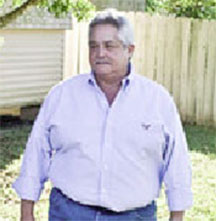ORLANDO, Fla., (Reuters) – Mario Hernandez, 58, passed multiple background checks to serve in the U.S. Army and as a federal prison guard trusted enough to watch over Oklahoma City bomber Timothy McVeigh.

It wasn’t until he retired from government service and began in 2013 to apply for a passport to take his wife on a cruise that Hernandez, brought to the United States from Cuba at age 9, discovered he was not a U.S. citizen.
Hernandez applied for naturalization but in November was rejected by the U.S. Department of Homeland Security. Now, immigration lawyer Elizabeth Ricci, who filed an appeal, fears the agency, caught in what she called a “P.R. nightmare,” is preparing criminal charges accusing him of falsely holding himself out as a citizen.
“This feels like my whole world is being turned upside down,” Hernandez said. “I’m very afraid.”
Hernandez arrived with his family from in 1965 aboard a so-called “Freedom Flight.” Under the Cuban Adjustment Act of 1966, he was eligible to apply for a green card, or permanent resident status, after one year and for naturalization after five years.
Hernandez told Reuters he long thought the military took care of his naturalization paperwork when he enlisted in 1975 during the Vietnam War. Ricci said federal law allows immigrants who serve during a “designated period of hostility” to skip directly to naturalization.
In the appeal, Ricci wrote that Hernandez, then 19, gave Army recruiters in California his immigration documents and was taken to what he thought was an immigration judge. The judge reviewed the paperwork, administered what Hernandez believed to be an oath of naturalization, and changed Hernandez’s name by dropping one of his surnames.
Hernandez then was taken back to his Army recruitment post where he took a second oath with other soldiers and joined them on a train to Fort Polk, Louisiana, according to the appeal.
“I think the federal government is mortified how they dropped the ball so many times and they’re turning it around and putting the burden on him to prove he is not a criminal,” Ricci said.
A spokesman for U.S. Citizenship and Immigration Services could not be reached for comment.
Ricci said she previously represented two other clients with similar experiences in the military.
“I suspect there are hundreds if not thousands of cases like this around the country,” Ricci said. “I think more people will hear his case and say, ‘Hey, I never did get that naturalization paperwork.’”
